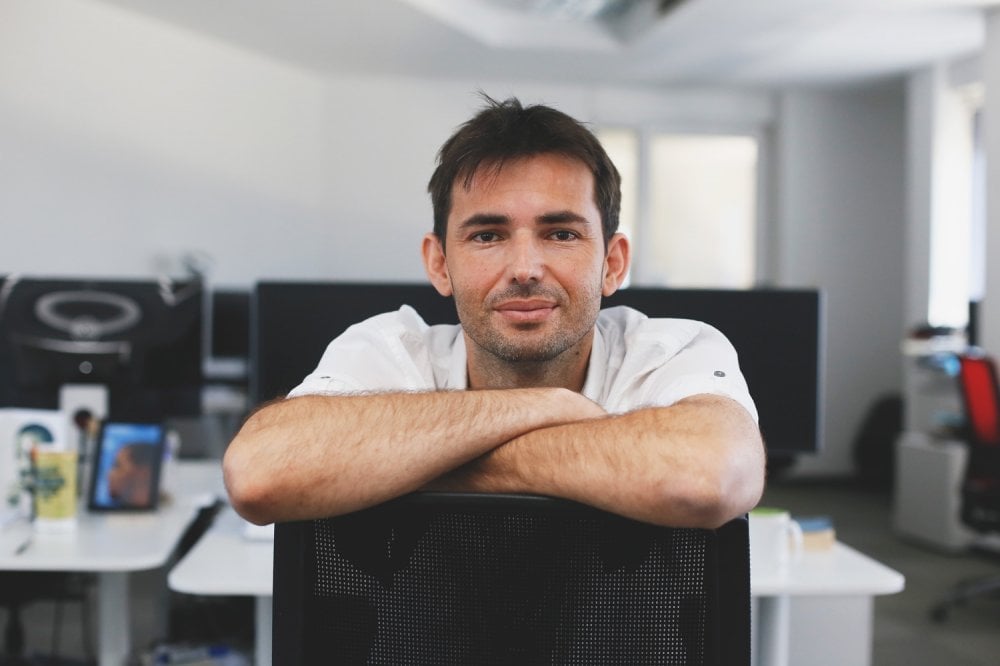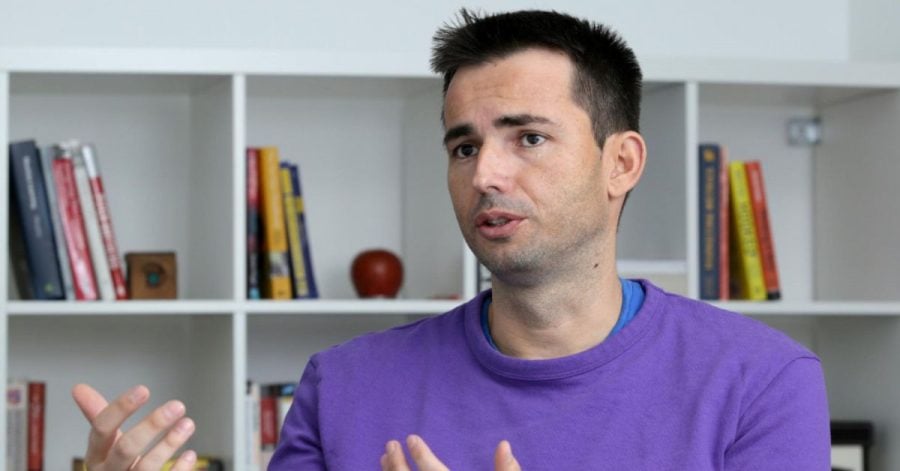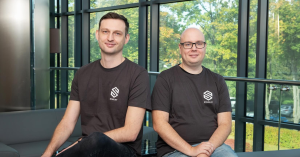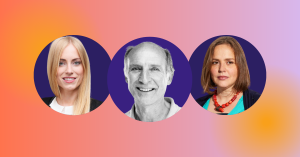With a vision for a future where humans and machines work together to benefit humanity, Croatian entrepreneur Mislav Malenica and his team are paving the way for a new era of innovation and technological advancement through their learning platform called Mindsmiths.
Founded in 2019, Mindsmiths has been focusing on developing its AI platform that enables the development of AI-first apps that can be used in various industries, such as in healthcare for patients with chronic conditions or for financial advice for clients in the banking sector. At the end of 2021 the Croatian startup raised €1.2M seed round to further develop and expand its learning platform.
An expert in AI, machine learning, game theory and modeling of human behavior, Malenica has 18 years of experience in the field – first as a research fellow at the largest Croatian scientific research institute “Ruder Boskovic”, and then later through AI startups in Silicon Valley and Europe.
In an interview for The Recursive, Malenica delves into his background as a mathematician and scientist, and how his life experience took him even further onto the path of entrepreneurship.
The Croatian founder also discusses the philosophy behind Mindmisths and shares his insights on the potential benefits and challenges of coexistence between organic and synthetic intelligence, and how his learning platform Mindsmiths is contributing towards shaping the future of our world.
The Recursive: What is the vision on which you’ve built Mindsmiths?
Mislav Malenica: I really believe that if people want to help other people then they really need first to understand what is the state of mind of these other people. So if I want to be a good parent, what will help me the most is understanding how my child actually feels, what is going on at school. Or if I’m a bank, I should be able to understand how each of my clients feels, what’s happening in their lives, maybe they need my assistance, but they don’t even know that they need my assistance, and so on.
And then I started analyzing what’s happening in the world. We have like three big platforms – the first one is the Internet, which changed the way how brands and companies interact and connect to consumers. Then there were the mobile phones and the first thing that really opened people’s minds was the first iPhone and it was then when people realised that their device is not just a tool for communication, but that it can be so much more.
Now I would say in the last few years it has become obvious that AI will again change the way we interact with each other, and how we interact with brands. I’ve been in this field for 18 years – first five years as a scientist and the next 13 years as an entrepreneur. And for me, it was always that the technology is there and it is happening, but it was never mature enough so we could actually apply it.
Then, it became obvious that technology will be mature enough, and that the world is going in this direction, where we will have a model as a service company like OpenAI. There will be many of these companies that will provide these models that will help you understand language, help you understand image and so on. However still you will need to be able to create these digital beings and we want to build a platform that enables the easy creation of such digital beings (AI-powered apps, chatbots and other tools).
It’s very easy to leverage all these models, it’s easy to leverage auto ML capabilities and so on, but the average company or average engineer won’t be super proficient in AI. They won’t have enough time or access to these big datasets, but we’ll still need to be able to create something that creates value for both companies and consumers.
And that’s how we started building the Mindsmiths platform. Our idea was, let’s leverage the technology that already exists there and package it into a system that enables every developer, every product company or every company in the world to quickly build something that will be helpful to them.
What is in the essence of the Mindsmiths platform?
We had few principles that were actually guiding all our decision making process and that was that we want people to be able to accept these digital beings into their lives. And in order to accept them, they need to have three key characteristics.
The first one is that they need to be able to show that they have expertise. So you need to have a feeling that even if you’re interacting with AI, this AI has the right expertise and it’s not wasting your time.
The second characteristic is that it needs to be able to demonstrate to you that it knows you. So it won’t be like meeting a different person every time, but instead it remembers conversations and memorizes – for example if it’s in the financial industry then it tracks what’s happening in your account and what kind of decisions you’re making. If it’s in healthcare, it knows what the doctor prescribed for you, it tracks if you are on track with that, and so on, so that you have a feeling that when you’re interacting, this is someone who really knows you deeply.
And the third characteristic is that it cares – so it’s not just a dumb system, or a tool that sits somewhere in the garage and waiting for you to turn it on. It’s basically something that’s alive 24/7 and thinking of ways to help you. If it concludes that it cannot help you then it will be quiet. But when it concludes that there is a way that it can help you, then it proactively reaches out to you.
When we demonstrated the first applications of such technology we learned that people can really connect with it and that a real relationship can be forged. And this was super powerful, because it’s proved to me that this concept actually makes sense and I really believe that this will be the future.
Also, sometimes people say that right now a person can have like 150 meaningful connections. I think that in the future this will remain the same, but not all of these 150 connections will be made with organic intelligence, but that some of them will be with synthetic intelligence.
What are some of the benefits that these digital beings can provide to humanity?
The whole vision and mission behind this platform is that we want to be able to build these digital beings to be able to provide something that was until now only reserved for billionaires. Because they have the right medical advice all the time, the right financial advice all the time, the right parenting advice, advice on what to do about their careers, what to do about their wealth, and so on – and other people, we just don’t have that.
But if I can encapsulate that into something that’s digital, that’s easily replicable, then I can basically provide it to the whole world. And this is the whole motivation – how to help the world make better decisions consistently.
I’m a father of six kids and the thing that I learned is that no one prepared me for that. No one gave me a textbook on how to be a good father or a good husband and I thought this is the foundation of the whole world – having children, raising them and so on. And then you end up in a situation where you’re completely clueless and you’re asking yourself why don’t I have better assistance? Why don’t I have best practices and so on?
And it’s the same in many other industries – for example we start thinking about our health when we are ill, instead of having the situation of me as a kid getting a digital being helping me make good health related decisions so that I don’t get sick. Before that this was not possible, but with AI, it will be possible and I think that this is where we are actually heading.
How can organic and synthetic intelligence coexist in such a context?
So you have what I call a mathematical definition of what is love – you have neuroscientists that will just tell you that love is when someone balances your nervous system. So it’s like a mother and a child, friends, families, and so on, basically what these people actually do is that they’ll help you balance your nervous system.
The question here is can we actually build AI that helps me balance my nervous system?
And that’s what we have shown that we can do. For example, we are applying this in healthcare that people start loving it in a way that someone gives you peace of mind because you feel that there’s someone in a healthcare system thinking about you, monitors you, connects with you.
No country in the world is rich enough to provide this to patients or especially chronic patients who have been sick for decades – to give them the level of attention and care that these people need, deserve or desire. They feel alone and rejected from society. This is when you create this digital being, it can be an assistant, a connection to a doctor, and this digital assistant has clear instructions on what to do.
And when you give this kind of digital beings to those patients they’ll just say: “Wow, I have peace of mind, I feel as if the doctor sees me”. And then the level of stress goes down, and the need to see a doctor actually goes down as well. In turn, this is better for them and their outcome, it’s better for the whole medical system and it also helps doctors focus on patients that need help.
If you go deeply into the psychology of these situations, you’ll then see that it’s very similar in many other industries – I just want someone to give me a peace of mind that I’m doing everything well, that I’m on right track that I’m doing the good things for myself or my kids, for my family, for the people around me, for my company and so on. And I don’t get that feedback, because there aren’t enough people and enough experts who are willing to do this for free. What we learned is that you can actually create this deep connection between AI and humans.
How open are people when it comes to the use of such technology and these digital beings?

I would say the most important part is that it shouldn’t be about the technology, it shouldn’t be about the person. So if you can actually show that you understand a person’s need, then you can show a person how this technology can help him, give him a peace of mind, advice or access to some service.
So in this sense people don’t care if it’s AI or it isn’t AI. People only care if it’s AI when we are in situations where AI is the purpose to itself and when you’re basically creating something for show off and so on.
If you start talking whether something is AI or it isn’t then we are in that kind of conversation that usually means you’re not thinking about the patient and their needs, but you’re thinking about how we want to show off because you’re using the latest technology.
So I would say that if you create the right product then people wouldn’t care that much if it’s AI supported or based on AI, and so on. The focus should be really on the person who is actually on the receiving side and making sure that we provide what this person needs, and then people really adopt technology really easily.
What are the negative implications and are there any grave concerns when it comes to AI?
AI is a tool as any other so it can be used as a tool, but also as a weapon. So there aren’t any negative things about the AI itself, but it is about the practices and how people could actually use it.
Then there is the matter of what if someone really has bad intentions, and what they can actually do with AI. One of the things that I’m most afraid of is that you can really manipulate public perception.
I know that I am creating a digital being for every person, I make sure that my digital beings are there to create value for you. But someone could use my technology to build digital beings who will be there to actually manipulate your perception of the world – how you see the political situation, financial situation, and with the idea to actually influence your decisions against your actual benefit, and so on.
As humans we will need to adapt that this technology exists, and that it will be again the same thing – will either trust people behind it or you won’t trust people behind it.
And people usually talk about AI as it’s a being for itself and that it’s only AI somewhere there – but it’s not and it’s just a tool to enhance and help people. So here your job or duty is always to ask who are the people behind the tool, and what their intentions are.
Similar to the internet, I would say that all the discussions that we had about the internet and where people are usually products and not customers are also applicable to the AI discussion.
What would you say is the biggest challenge that AI is facing over the next few years?
It won’t be something like regulation – I think it will really be about educating people about what’s possible with this technology. So it’s similar to the internet, you have a digital native generation, and you have people who have to learn about it.
With AI right now, people’s intuition really doesn’t work for them and most just don’t know intuitively what’s possible, what’s not possible, so it will take some time.
For example, when we started the Croatian AI association, the whole idea was that the whole world will be based on AI over the next 30 years. So our job should be to educate people here and in the region about this platform that is coming or is already here, and about what it can do and what it cannot do. But one crucial thing is that you cannot neglect it, it is here and no one can stop it from happening.








